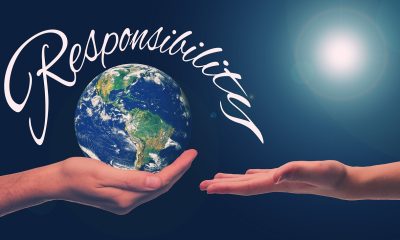Featured
The ESG Fever in Emerging Markets: up to 150 Billion in Bonds Were Issued
More than 70% of the 125 investors interviewed by Bank of America Global Research for its latest annual survey of emerging issuers already have an ESG or sustainability policy. The survey found that a further 21% of investors adhere to these guidelines in their decision making and 65% take these criteria into account, but are flexible in their asset allocation.

ESG (environmental, social, and governance) fever has taken hold in emerging countries. So much so that bond issuance associated with the “green”, “social”, “sustainable” or “sustainability-linked” label by companies, states, and agencies in these geographies has soared in the last year to more than $150 billion (some €123.8 million). This figure represents practically one out of every four responsible emissions made in the year of the pandemic, according to data managed by the international organization Climate Bonds Initiative (CBI).
The coronavirus crisis has given an obvious boost to responsible investment. Its particularities have highlighted the extent to which decisions – whether public or private – should not focus solely on short-term economic gain. Emerging countries (China, India, Indonesia, Brazil, and Russia, but also Mexico, Argentina, South Africa, Poland, Turkey, and South Korea) have become aware of this shift in perspective and do not want to be left behind.
Read more on the subject and find the latest business headlines with the Born2Invest mobile app.
Investment funds are poised to become very important in Spain
More than 70% of the 125 investors interviewed by Bank of America Global Research for its latest annual survey of emerging issuers already have an ESG or sustainability policy. The survey found that a further 21% of investors adhere to these guidelines in their decision making and 65% take these criteria into account but are flexible in their asset allocation. Climate change, governance, and renewables focus their attention and, three years down the road, nearly four in ten say they could reduce their exposure to oil and gas.
“In 2021, data and standardization remain the biggest challenge, but we’ve also heard about ‘greenwashing,’ ESG integration across organizations, increasing ESG awareness at the local and national level, and achieving real change,” noted the U.S.-based analysts. Among the concerns that are driving investors up the wall are the costs associated with these responsible criteria.
The cost of achieving zero emissions
In the case of the fight against climate change and emission reduction targets, the process, although slow, costly and uneven, is also possible. BofA believes that in this race, the power generation and transportation sectors should lead the change over this decade, while infrastructure, buildings and industry should take over in the 2030s, while the agricultural sector could be left behind in the process. “This energy shift will likely mean more solar panels, wind, nuclear, hydrogen and batteries. It is important to note that current technology can only take us halfway to net-zero emissions, so breakthroughs and innovation should be crucial,” they note.
However, it cannot all be technological breakthroughs; the turnaround is likely to require major cost-focused policies. With a global GDP of around $90 trillion and tax revenues of around $20 trillion, the planet will need a major redistribution of resources by 2050. What is the estimated cost of achieving this “net zero” emissions: according to the International Energy Agency (IEA), the bill will reach $5 million per year for three decades (about $150/t multiplied by 34 Gt CO2e).
“Considering how cheap thermal fuels remain, high carbon prices (negotiated, fixed or implicit) will be a key component in preventing global temperatures from rising,” BofA Global Research says. So far, over the last 12 months, the number of companies that have committed to achieving “net zero” carbon has doubled again. However, the gap between the ambition to reduce CO2 emissions to zero in the coming decades and the reality is wide. “It is still difficult to determine how these voluntary commitments will lead to the achievement of the targets. In this respect, greater clarity would be desirable,” notes Roland Rott, CFA, in La Française.
“What is at stake is the next transformation of the economy towards zero-emission growth”
The urgency of the climate crisis has raised the bar, even higher after the signing of the 2015 Paris Agreement. Reducing CO2 emissions has become a strategic objective for many companies and their stakeholders, including shareholders and bondholders. This is key since, according to the expert, “what is at stake is the coming transformation of the economy towards emission-free growth: business models are becoming obsolete, new business activities are emerging, adaptations are necessary, and each company must make its specific response to climate change known.”
Unrestricted exploitation of natural resources has not taken into account negative externalities. Moreover, future crises may result from environmental and social instability, the pandemic being a perfect example in the opinion of Christophe Donay, Head of Macroeconomic Analysis, and Julien Holtz, Emerging Markets Strategist at Pictet WM. They believe that the energy transition away from the carbon economy will require very long-term investment projects. Governments and central banks will integrate these issues into their policies. This will promote growth and inflation, but at the same time is a reason why interest rates can remain low.
__
(Featured image by cocoparisienne via Pixabay)
DISCLAIMER: This article was written by a third party contributor and does not reflect the opinion of Born2Invest, its management, staff or its associates. Please review our disclaimer for more information.
This article may include forward-looking statements. These forward-looking statements generally are identified by the words “believe,” “project,” “estimate,” “become,” “plan,” “will,” and similar expressions. These forward-looking statements involve known and unknown risks as well as uncertainties, including those discussed in the following cautionary statements and elsewhere in this article and on this site. Although the Company may believe that its expectations are based on reasonable assumptions, the actual results that the Company may achieve may differ materially from any forward-looking statements, which reflect the opinions of the management of the Company only as of the date hereof. Additionally, please make sure to read these important disclosures.
First published in LA INFORMAC!ON, a third-party contributor translated and adapted the article from the original. In case of discrepancy, the original will prevail.
Although we made reasonable efforts to provide accurate translations, some parts may be incorrect. Born2Invest assumes no responsibility for errors, omissions or ambiguities in the translations provided on this website. Any person or entity relying on translated content does so at their own risk. Born2Invest is not responsible for losses caused by such reliance on the accuracy or reliability of translated information. If you wish to report an error or inaccuracy in the translation, we encourage you to contact us.

-

 Markets5 days ago
Markets5 days agoCotton Market Weakens Amid Demand Concerns and Bearish Trends
-

 Crypto2 weeks ago
Crypto2 weeks agoIs Strategy’s Bitcoin Bet Becoming a Dangerous House of Cards?
-

 Fintech3 days ago
Fintech3 days agoFintech Alliances and AI Expand Small-Business Lending Worldwide
-

 Crowdfunding1 week ago
Crowdfunding1 week agoSpain’s Real Estate Crowdfunding Boom: Opportunity, Access, and Hidden Risks

























